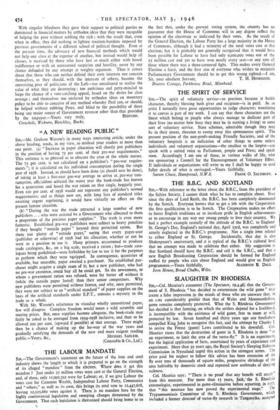A NEW READING PUBLIC "
Sig,—Mr. Graham Watson's in many ways interesting article, under the above heading, tends, in my view, to mislead your readers at more than one point. (a) " Increase in paper allocation will shortly put publishers in the position of having 75 per cent. of their pre-war requirements." This sentence is so phrased as to obscure the crux of the whole matter. The 75 per cent. is not calculated on a publisher's " pre-war require- ments "; it is calculated on his individual consumption during the single year of 1938. Instead, as should have been done (as should now be done), of taking at least a five-year pre-war average to arrive at. pre-war 'con- sumption, officialdom selected the worst year the book-trade has known for a generation and based the war ration on that single, beggarly year. Even too per cent. of 1938 would not represent any publisher's normal requirements; and as things now are, with long lists of standard titles awaiting urgent reprinting, it would have virtually no effect on the present famine situation. (b) " During the war the trade attracted a large number of new publishers ... who were assisted by a Government who allocated to them a proportion of the precious paper supplies." The truth is even more fantastic. Established pre-war publishers were subject to heavy penalties if they bought " outside paper " beyond their permitted ration. But there was plenty of " outside paper," seeing that every paper-user (publisher or otherwise) of 1938 had his allocation, whether or not he were in a position to use it. Many printers. accustomed to produce trade catalogues, &c., on a big scale, received a ration ; but—trade cata- logues being prohibited—were forbidden by law to use it for the purposes to perform which they were equipped. In consequence, quantities of available, but unusable, paper awaited a purchaser. No established pur- chaser might acquire a single ream of it; but a new publisher, who had no pre-war existence, could buy all he could get. So the newcomers, to whom a government ration was refused, were far better off without it (while the outside paper lasted) than their senior competitors. Why new publishers were permitted without licence, and why, once permitted, they were not subject to an " artificial standard" of paper supplies on the lines of the artificial standards under E.P.T., remains a mystery to the trade as a whole.
With Mr. Watson's reluctance to visualise wholly unrestricted paper, few will disagree. Complete freedom would'mean a wild scramble and soaring prices. But, once supplies become adequate, the book-trade may fairly be asked to be averaged from 1934-1938 inclusive, and then to be allowed zoo per cent. (upward if possible) of that average. There might then be a chance of making up the lee-way of the war years and. gradually satisfying the demands of the new and more exigent reading public.—Yours, &c., MICHAEL SADLEIR. (Constable & Co., Ltd.).






























 Previous page
Previous page